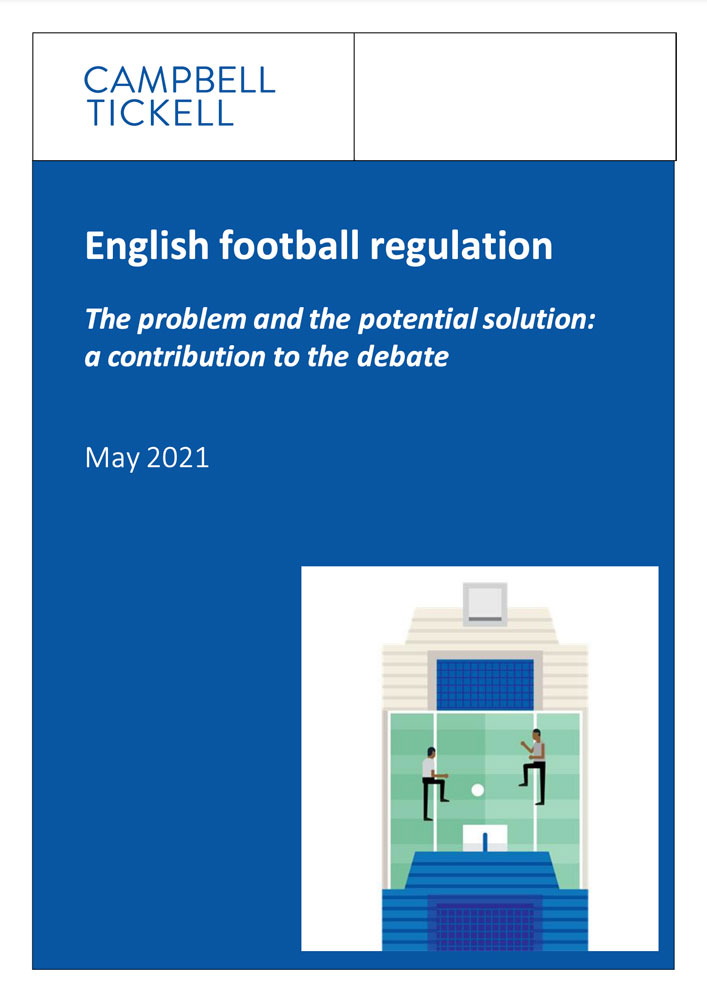Regulation to the rescue?
Football’s prospects for change following the Crouch Review of governance

GOVERNANCE
Background image: Istock

Greg Campbell
Partner, Campbell Tickell
In 2019, Bury Football Club collapsed. Despite a proud 134-year history, the club fell victim to incompetent leadership and ownership, and financial mismanagement.
The result was devastating for the local community. It has long been recognised that football clubs have a special role for the towns and cities where they operate. And yet there have been numerous failures and changes of direction that supporters and local people have been unable to affect. Examples include Wimbledon FC’s uprooting and move 70 miles to Milton Keynes, complete with change of club name; the demise of Macclesfield Town; and the crises at Coventry City, Hereford, Portsmouth, Blackpool, Wigan, Derby and so many others. While the recent acquisition of Newcastle by an entity viewed as close to the Saudi government has again highlighted shortcomings in how tests that owners are ‘fit and proper persons’ are conducted.
How have such cases arisen? A central aspect is a failure of governance and weak to non-existent regulation, that have allowed club owners to do as they please with their ‘trophy assets’. This is often regardless of the views of their supporters – people whose commitment to their club is typically lifelong, rather than here today, gone tomorrow – when a tasty new ‘franchise’ appears or the owners get bored.
ESL own goal
And sure enough, earlier this year, we saw the European Super League debacle, when a dozen major club owners, including six from England, sought to engineer a breakaway competition that would enrich their clubs at the expense of the rest of the sport. Fortunately this rapidly collapsed in the face of a collective international howl of outrage from fans, with politicians following suit.
But the big clubs’ would-be direction of travel and unwillingness to be held more widely accountable, were clear. Feeble governance is not unique to football, of course. We have seen this with the recently highlighted failures of Yorkshire County Cricket Club to address serious allegations of racism and culture.
So what can be done? For football, there is potential help at hand, following last month’s 162-page report of the ‘Fan-led Review of Football Governance’, established by the government and chaired by former Sports Minister, Tracey Crouch. The review received a huge number of submissions, including from Campbell Tickell, plus we also contributed to the submissions from the Football Supporters Association and Fair Game (a recently established organisation with 33 football clubs in membership). These submissions have proven influential in the overall review recommendations.
Fan-led review
There is much to be optimistic about in the report – provided the government plays its part and finds space in the parliamentary timetable for the legislation needed. In summary, the main strategic recommendations are:
- The government should create a new Independent Regulator for English football (IREF)
- To ensure financial sustainability of the professional game, IREF should oversee financial regulation
- New owners’ and directors’ tests for clubs should be established, ensuring that only good custodians and qualified directors can run these assets
- Football needs a new approach to corporate governance to support a long-term sustainable future for the game
- Football needs to improve equality, diversity and inclusion in clubs with committed EDI Action Plans regularly assessed by IREF
- Supporters should be properly consulted by their clubs in taking key decisions, by means of a Shadow Board
- Football clubs are a vital part of their local communities and there should be additional protection for key items of club heritage
- Fair distributions of football’s income are needed, and the Premier League should make additional, proportionate contributions to further support football
- Women’s football should be treated with parity and given its own dedicated review
- The welfare of players exiting the game needs better protection – particularly at a young age
The signs are positive, with Culture Secretary Nadine Dorries having stated: “I can confirm we're endorsing in principle the primary recommendation of the fan-led review of football governance. We’ll now work at pace to determine the most effective way to deliver an independent regulator.”
What this will look like in practice and how far government will be prepared to go, and on what timescale, remain to be seen. There is no doubt the proposals would seriously encroach on the near-absolute power many owners currently enjoy. And that in turn means there will be powerful forces deployed to scale back the proposed changes.
“Everybody who can see the value and importance of these proposals, and the potential to bring greater equilibrium, fairness and inclusion to football, starting to restore clubs’ community ethos, is encouraged to declare their support for implementing the Crouch Review proposals in full, not least by writing to your MP.”
Everybody who can see the value and importance of these proposals, and the potential to bring greater equilibrium, fairness and inclusion to football, starting to restore clubs’ community ethos, is encouraged to declare their support for implementing the Crouch Review proposals in full, not least by writing to your MP.
More broadly, now the spotlight has been shone on the failings of how football is presently run, a knock-on effect on other sports is likely. The England & Wales Cricket Board has announced an investigation of dressing room culture at domestic and international levels, following the recent revelations from Azeem Rafiq of the racism he suffered throughout his career. It is also striking that sports minister Nigel Huddleston has threatened to create an independent regulator for cricket if the ECB does not put its house in order over racism.



